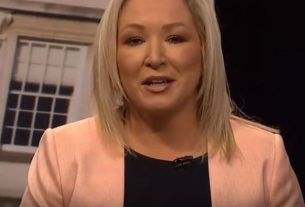The culture secretary Oliver Dowden has hailed plans to replace EU data laws with a new “light touch” British framework as “one of the biggest prizes” of Brexit.
Dowden said the new rules will deliver a “data dividend” that will boost economic growth in the digital economy.
His comments come as the UK’s economic recovery is showing signs of stalling as the impact of the pandemic and Brexit hits.
Worker shortages across multiple sectors have combined with disruption to the global supply chain affecting most advanced economies.
The Bank of England has released figures showing debit and credit spending is just 94% of its pre-pandemic level, evidenced by an unexpected drop in retail sales recorded in July.
“The recovery has stopped in its track,” said economist James Smith, who works for Dutch bank ING. “The rise in self-isolation clearly had an effect on services spending, and the supply chain issues are having an impact on manufacturing.”
While the UK has seemed to escape what was expected to be the worst jobs crisis since Margaret Thatcher was in Number 10 – fears are mounting the post-lockdown upsurge has stalled following the deepest global recession since the 1930s’ great Depression, caused by the coronavirus.
“For now, the recovery has paused but we’re still probably looking at just about positive growth through the third quarter,” said Smith.
Date reform is ‘one of the big prizes of leaving’ the EU, says Dowden
Meanwhile, Dowden has told the Telegraph that reforming the EU data laws is “one of the big prizes of leaving” the EU with the government’s plans for a UK system set to be unveiled next month.
It will see divergence from the EU’s General Data Protection Regulation (GDPR) that critics claim provides little benefit compared to the difficulties faced by businesses in implementing the law.
“There’s an awful lot of needless bureaucracy and box ticking and actually we should be looking at how we can focus on protecting people’s privacy but in as light a touch way as possible,” said Dowden, citing numerous examples of problems.
The culture secretary said the Church of England warned churches are having difficulties sending parish newsletters advertising jumble sales as they require prior consent to send marketing messages.
The end for ‘pointless’ cookie-consent
Scientists also have problems exploring areas outside their original research under GDPR, which requires them to gain fresh permissions; while small businesses and charities are being overwhelmed by the amount of checks they must undertake regarding data protection.
“We should not expect exactly the same from a small family run business as we do from a massive social media company,” said Dowden.
Part of the plans includes the end for “cookie-consent”, many of which the culture secretary says are “pointless”, despite the significant threat they pose to online privacy,
Opponents of a more relaxed data protection policy say this could lead to even more profiling and harvesting of personal data, though Dowden claims we can still ensure that high standards of privacy are protected” under his reforms.
ICO to be headed by New Zealand’s privacy commissioner
As part of the Brexit deal the government agreed to incorporate GDPR for the next four-years covering what the Telegraph calls “lucrative commercial transfers and law enforcement cooperation”.
Breaking the agreement may result in UK companies facing even more bureaucracy in dealing with EU businesses.
Dowden has appointed New Zealand’s privacy commissioner, John Edwards, to lead the UK’s Information Commissioner’s Office (ICO), replacing Elizabeth Denham who has been accused of chasing headlines rather than focusing of the core issues of the role.




